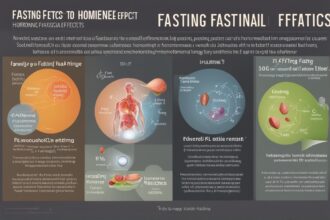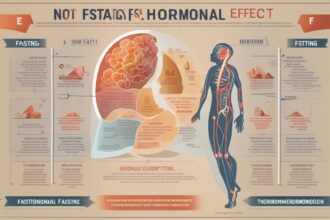Have you ever wondered how fasting affects your body on a deeper, hormonal level? When we talk about hormones and fasting, we’re diving into a fascinating intersection of biology and lifestyle. fasting, whether it’s intermittent fasting, extended fasting, or time-restricted eating, isn’t just about skipping meals—it’s a powerful tool that can influence your hormonal balance, metabolism, and overall health. In this post, we’ll explore the science behind fasting’s impact on key hormones, debunk some myths, and share practical tips to help you harness these effects for better well-being. Let’s break it down and see how your body responds when you give it a break from constant eating.
What Happens to Hormones During Fasting?
When you fast, your body shifts gears, moving away from a “fed” state to a “fasted” state. This transition triggers significant changes in your hormonal environment. Hormones and fasting are closely linked because hormones act as messengers, telling your body how to adapt to the absence of food. For instance, insulin, the hormone responsible for managing blood sugar, drops dramatically during fasting. This reduction allows your body to tap into stored energy, like glycogen and fat, for fuel. Meanwhile, other hormones like glucagon and growth hormone rise to maintain energy levels and protect muscle mass. Understanding these shifts can help you appreciate why fasting feels so different from regular eating patterns and how it can benefit your health when done correctly.
Key Hormones Affected by Fasting
Fasting doesn’t just affect one or two hormones—it creates a ripple effect across several systems. Let’s look at some of the major players in the hormonal response to fasting and how they adapt during periods of food restriction. These changes are often why people report improved energy, mental clarity, or even weight loss during fasting protocols.
- Insulin: Levels drop as your body stops processing incoming glucose, promoting fat-burning instead of fat storage.
- Glucagon: Rises to help release stored glucose from the liver, keeping blood sugar stable.
- Growth Hormone: Increases significantly, aiding in fat metabolism and muscle preservation.
- Cortisol: May spike initially as a stress response but often stabilizes with consistent fasting practices.
- Norepinephrine: Boosts alertness and energy by mobilizing fat stores for fuel.
How Fasting Impacts Metabolism Through Hormones
One of the most talked-about benefits of fasting is its effect on metabolism, and this is largely driven by hormonal changes during fasting. When insulin levels fall, your body switches from storing energy to burning it. This metabolic shift is often referred to as “ketosis” in longer fasts, where fat becomes the primary fuel source, producing ketones for energy. Growth hormone also plays a role here, enhancing fat breakdown while protecting lean muscle tissue. Additionally, the increase in norepinephrine during fasting can temporarily boost your metabolic rate, helping you burn more calories even at rest. This hormonal dance is why many people find fasting to be a sustainable way to manage weight and improve metabolic health, as long as it’s paired with a balanced diet during eating windows.
The Role of Stress Hormones in Fasting
Fasting isn’t always a walk in the park, especially when stress hormones like cortisol come into play. In the early stages of fasting, or if you’re new to it, your body might interpret the lack of food as a stressor, leading to a spike in cortisol. This can make you feel jittery or irritable—hello, hanger! However, as your body adapts to regular fasting, these hormonal fluctuations and fasting stress responses often mellow out. The key is to start slow and listen to your body. Chronic elevation of cortisol can be counterproductive, potentially leading to muscle loss or fat retention, so it’s important to balance fasting with stress management techniques like deep breathing or light exercise.
Practical Tips to Optimize Hormonal Balance While Fasting
Now that we’ve covered the science behind hormones and fasting, let’s get into some actionable advice. Fasting can be a game-changer for hormonal health, but only if you approach it thoughtfully. Here are some tips to ensure your hormones stay in harmony while you fast, helping you avoid common pitfalls like fatigue or cravings.
- Start with Shorter Fasts: If you’re new, try a 12:12 or 14:10 intermittent fasting schedule to ease your body into hormonal shifts.
- Stay Hydrated: Dehydration can stress your system and spike cortisol, so drink plenty of water during fasting windows.
- Eat Nutrient-Dense Meals: Break your fast with balanced meals rich in protein, healthy fats, and fiber to support hormonal stability.
- Avoid Overtraining: Intense exercise during long fasts can elevate stress hormones, so opt for light activities like walking or yoga.
Potential Risks and Hormonal Imbalances to Watch For
While fasting can have incredible benefits for hormonal regulation, it’s not a one-size-fits-all solution. For some, especially women, excessive or poorly managed fasting can disrupt hormonal balance and fasting outcomes. For example, prolonged fasting may affect reproductive hormones like estrogen and progesterone, potentially leading to irregular cycles or fertility challenges. Similarly, if cortisol remains elevated due to over-fasting or poor sleep, it can counteract the positive effects on insulin and metabolism. If you notice symptoms like extreme fatigue, mood swings, or changes in your menstrual cycle, it might be a sign to scale back or consult a healthcare provider. Fasting should feel empowering, not draining, so always prioritize your body’s signals over rigid schedules.
In conclusion, the relationship between hormones and fasting is a complex but rewarding one. By understanding how fasting influences key hormones like insulin, growth hormone, and cortisol, you can tailor your fasting practice to support your health goals—whether that’s weight management, improved energy, or metabolic flexibility. Remember, fasting isn’t just about deprivation; it’s about giving your body a chance to reset and thrive through hormonal optimization. Start small, stay consistent, and pay attention to how your body responds. With the right approach, fasting can be a powerful ally in balancing your hormones and enhancing your well-being. Have you tried fasting yet? Let us know in the comments how it’s impacted your energy or health—we’d love to hear your story!






